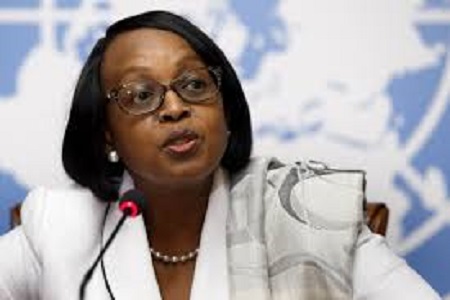…urges countries to invest in insulin, diabetic products
By Joyce Remi- Babayeju
As the world marks the 2021 World Diabetes day today, the World Health Organization, has estimated that 45 million Africans are likely to be Diabetic by 2025.
WHO Regional Director for Africa, Dr Matshidiso Moeti made this known in a message to mark the day in the African Region.
She said, ‘ In the African Region , more than 19 million people are living with Diabetes and this number is expected to grow to 47 million by 2025.”
Moeti said, ” The theme this year, and until 2023, is “Access to diabetes care” because too many people still do not have access to diagnostics, medicines and monitoring devices that can help with diabetes management.”
The global health agency laments that at least two- third of Africans living with diabetes are unaware of their condition which is charaterized with risk factors such as family history, age, over weight,sedentary lifestyle, unhealthy diet, or use of alcohol or tobacco.
WHo disclosed that this year makes the centenary discovery of Insulin in 1921, a scientific
achievement which changed the lives of people living with diabetes, adding one hundred years on from this hugely important innovation, premature death among people with diabetes is still high in many African countries, because of late diagnosis and a lack of access to insulin.
WHO decries that patients are diagnosed with diabetes but cannot get the treatment they need due to shortage of insulin in public hospitals and the costs of insulin. Citing Ghana as example of where it would take the average worker more than five days of earning to save up for a monthly supply of insulin.
WHO emphasied that in most African countries the cost of insulin and monitoring products for diabetes and other non -communicable diseases are paid out of pocket by individuals and their families.
Meanwhile WHO survey on access to essential services during the COVID- 19 pandemic has severely disrupted access to diabetes care in the African Region.
In a bid to improve access to quality diabetes care WHO says it launched the Global Diabetes Compact in April, 2021 to rollout Package of Essential Non -Communicable Disease interventions for low resource settings out of which 21 African countries like Benin, Eritrea, Eswatini, Lesotho and Togo amongst other have keyed into.
According to the message, if diabetes is left unchecked, without management and lifestyle changes, diabetes can lead to heart attack, stroke, kidney failure, lower limb amputation, visual impairment, blindness and nerve damage, including erectile dysfunction. People with diabetes are also at higher risk of developing severe COVID-19 symptoms.
Moeti said, ” So today I ask governments to invest in making essential products like insulin, blood glucometers and test strips available to all communities. This should be backed by training of health workers in noncommunicable disease prevention and management at the district and community level towards improving service availability.”
She also urge all people living with diabetes to protect themselves from severe COVID-19 illness and death, by getting vaccinated against COVID-19 as soon as you can.





